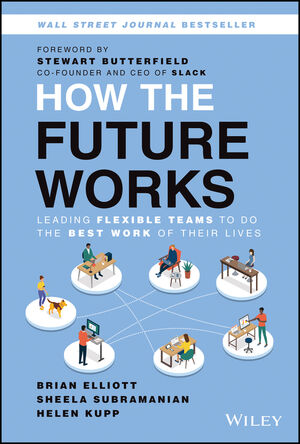Good books get passed around – either physically, or via word of mouth. I’d already got, and was deep into, How the Future Works (thanks to a tip-off from a colleague) when it hit the review list. So easy review I hear you call… well, yes and no.
The book builds out from Slack’s internal approaches to redefining the way they work – creating a strong case for change and challenging a great number of recently-surfaced myths around flex working (as ever, use your own word here). The authors, Brian Elliott, Sheela Subramanian and Helen Kupp, have woven together a strong set of case examples, from the likes of Boston Consulting, Dropbox and IBM. It’s a powerful story, highlighting how people in the 2020s want a paradigm change around work – life balance, flex, meaning, trust, autonomy… things that traditionally don’t appear in job specs. And, as you’d imagine, their content illustrates the many successes in this area.
Even better, they have built in page after page of practical guidance, tools and templates that can be used to shape responses and support processes to enable flex working. For me, they nail the right elements – aligned and committed leaders, teams given the autonomy to own and shape their working lives and manager skills (the critical soft ones) given a much needed boost. In particular, the Team Level Agreement is a thing of beauty. The authors cover it in depth, and it’s ready to go for many teams, in my view.
If you are struggling to get buy-in from your executive team for greater, true, flex working then this is the book to leave on their desks in the office. So compelling is it, I will guarantee they will dash out and demand things change (or hide it in their desk… you know your leadership team better than me). But, stepping into my challenge with it, there’s the contentious word – office.
This is a book for the white collar, office-orientated professional world. It makes little to no concession for workers in other sectors. And that’s a big problem (it’s why I paused half way through – the ideas I needed just aren’t here). As you may have heard or read me state – almost 50 percent of workers in the UK are in roles where remote working is impossible, where flex working is difficult and where wages are low enough that extra free time is filled with second or third jobs.
And I get that trying to cover it all would be an encyclopaedia’s worth of content. The untouched 50 percent is the harder half – there’s no easy fixes there, or glowing case studies. But I would argue that this should be called out more in the book.
OK, rant over. I do love this book, and keep quoting it regularly. It just makes sense. There are so many half-baked, overly dictatorial policies out there right now, and Elliott, Subramanian and Kupp breeze in and blow them all away. They talk about team ownership, becoming a learning organisation, about the power of trust – I want to work at Slack.
The simple take home message – flex can work, but you have to be smart about it and dig in for the long-haul. Read it if you are on the journey (and an office worker) and need inspiration and fuel.
Published by Wiley
Chris Preston is a culture expert and one of the founding partners of The Culture Builders






